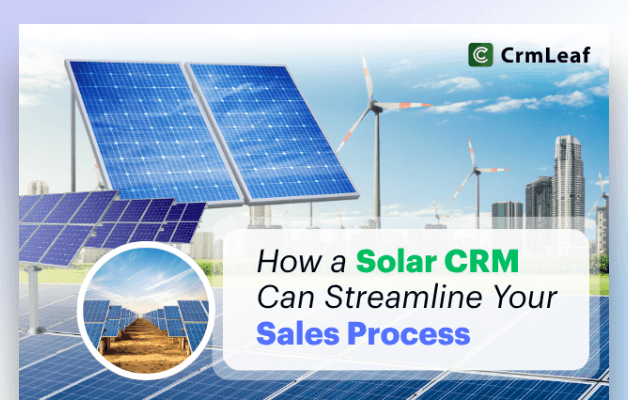In the rapidly evolving solar industry, sales teams face a unique blend of challenges, rising customer expectations, long sales cycles, complex financing options, and increasing competition. To stay ahead, solar companies must optimize their sales workflows, boost team productivity, and ensure seamless customer experiences. This is where a Solar Customer Relationship Management (CRM) system becomes indispensable.
In this blog, we’ll explore how a dedicated solar CRM can streamline your sales process, reduce inefficiencies, and empower your team to close more deals with confidence.
Understanding a Solar CRM
A Solar CRM is a specialized customer relationship management platform tailored to meet the specific needs of solar installation companies. Unlike generic CRMs, a solar CRM integrates key industry elements—lead qualification tools, site assessment checklists, solar-specific proposal builders, and financing calculators—into a single dashboard.
By centralizing customer data, project timelines, communications, and documentation, a solar CRM becomes the nerve center of your sales and operations strategy.
1. Centralized Lead Management
In the solar sales process, leads may come from multiple sources—website forms, referral programs, social media, call campaigns, or third-party lead providers. Managing them through spreadsheets or scattered tools leads to missed follow-ups and lost deals.
A solar CRM offers lead capture and tracking tools that consolidate incoming prospects in one place. With automated lead scoring and tagging, your sales reps can instantly prioritize high-quality leads based on location, energy needs, property type, or budget.
Key benefits:
- Reduced response time with automated lead routing
- No lead falls through the cracks
- Better sales forecasting with real-time analytics
2. Faster and Smarter Follow-Ups
Speed is critical in solar sales. The faster you respond to an inquiry, the more likely you are to win the customer. A solar CRM enables automated follow-ups via emails, SMS, or tasks, ensuring every lead is nurtured efficiently.
With predefined email templates and drip sequences, you can stay top-of-mind throughout the buying journey. Sales reps receive real-time alerts when leads engage with proposals or request information, making follow-ups timely and relevant.
Why it matters:
- Improves conversion rates by maintaining engagement
- Frees up reps from manual outreach tasks
- Increases professionalism and consistency in communication
3. Seamless Proposal Generation
Creating accurate, customized proposals is time-consuming, especially when you need to factor in roof conditions, energy usage, location, and financing options. A solar CRM often includes integrated proposal tools that pull customer data, calculate savings, and generate branded quotes in minutes.
You can use satellite imagery, 3D modeling, and smart calculators directly within the CRM to produce professional, personalized proposals that impress your prospects.
Advantages:
- Reduce proposal turnaround time from days to hours
- Boost customer confidence with transparent data
- Ensure pricing and system configurations are consistent across the team
4. Improved Team Collaboration
Solar sales teams often work across multiple locations, involving field reps, office staff, installers, and project managers. Without a centralized system, collaboration breaks down, and project timelines suffer.
A solar CRM brings all stakeholders into one connected platform. Shared access to project timelines, customer notes, installation status, and document history ensures everyone is on the same page.
Collaboration features include:
- Internal notes and tagging
- Task assignments and reminders
- Shared calendars and timelines
5. Sales Pipeline Visibility
One of the most powerful features of a solar CRM is its pipeline management dashboard. Sales managers can view the entire sales funnel in real time, understanding how many leads are in each stage, which deals are stuck, and where reps may need support.
This visibility helps with:
- Accurate sales forecasting
- Identifying bottlenecks
- Setting and tracking performance goals
Instead of guessing what’s working, you get data-driven insights to optimize your sales strategy.
6. Mobile Access for On-the-Go Reps
Solar sales professionals are frequently in the field, conducting site visits, taking measurements, or meeting homeowners. A mobile-friendly solar CRM gives reps access to lead info, schedules, documents, and notes—right from their phones or tablets.
This improves efficiency and ensures reps can update deal statuses or capture data without returning to the office.
Why mobile access matters:
- Increases responsiveness
- Speeds up data entry and reporting
- Enhances professionalism during client meetings
7. Integration With Design, Financing & Project Tools
A modern solar CRM doesn’t operate in isolation. The best platforms integrate with design tools (like Aurora Solar), financing partners (like Mosaic or Sunlight Financial), and project management software.
These integrations reduce duplicate data entry and keep your systems in sync, from initial contact to final installation.
Integration advantages:
- Streamlined handoff between sales and operations
- Reduced errors and rework
- Smoother customer experience
8. Enhanced Customer Experience
At the end of the day, customers want a smooth, transparent, and professional buying journey. A solar CRM helps you deliver that by:
- Keeping all communication and documents in one place
- Providing status updates and installation timelines
- Personalizing the journey based on individual needs
When your sales process runs like a well-oiled machine, customers notice—and that leads to more referrals, better reviews, and higher close rates.
Final Thoughts
The solar industry is poised for massive growth, but with growth comes complexity. A generic CRM can’t address the specific challenges of solar sales. By adopting a purpose-built solar CRM, you’re equipping your team with the tools they need to work smarter, close faster, and deliver a superior customer experience.
If you’re serious about scaling your solar business, it’s time to ditch the spreadsheets and siloed tools. Invest in a solar CRM—and let technology take your sales process to the next level.
Ready to transform your solar sales process?
Explore CRM solutions designed specifically for solar companies and see the difference a focused platform can make.




